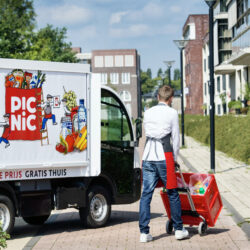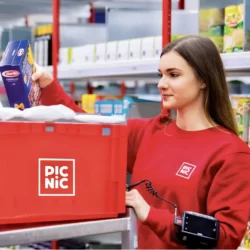Online retailer Picnic is out of the red thanks to robotization

Online supermarket Picnic made a profit in the Netherlands for the first time last year. According to director and founder Michiel Muller, this was mainly due to robotization of the distribution centre in Utrecht. But Picnic is still far from profitable overall; last year, the grocery retailer posted a loss of over €220 million.
The annual report shows that Picnic’s total turnover rose by over a third to more than €1.2 billion in 2023. Most of this came from the Netherlands, where sales increased by 28% to almost €800 million. Despite that, however, last year the €220 million net loss at group level even exceeded that of 2022, when it stood at almost €209 million.
Robotization of DC in Utrecht
Picnic did make a profit in the Netherlands for the first time, although the company did not disclose the exact amount. Muller attributes the move into the black mainly to robotization of the distribution centre (DC) in Utrecht, allowing more efficient operations. ‘In the last month of the year we became profitable, even though only 30% of the volume was robotized at that time,’ he is quoted as saying to De Ondernemer.
Earlier this year, the manual DC in Zaandam was closed and Picnic opened a second robotized distribution centre in Dordrecht. Muller: ‘We are now starting that up and rolling out the solution. By the end of this year, we hope to have robotized 50% of the volume. That should help us become even more profitable. The intention is to eventually robotize other distribution centres in the Netherlands as well.’
Expanded product range
Besides the eight distribution centres in the Netherlands, Picnic also has 57 hubs. Despite the fact that no new ones were added in the past year, volume increased by 30%. According to Muller, this is a sign that the online grocery shopping trend is incredibly strong, especially among young families. The good performances are also a result of the expanded product range, which has grown from 873 items to more than 1,600.
In Germany and France, the online supermarket also achieved substantial growth, of 41% and 147% respectively. ‘We now have eight distribution centres in Germany and two in France. Next year, we will open a robotized DC in Oberhausen, Germany. We are growing substantially abroad, but that also involves investments. So internationally, we are not yet profitable,’ Muller is quoted as saying by De Ondernemer.








